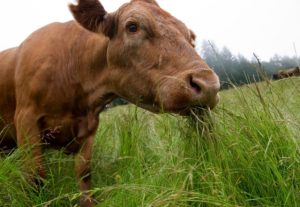Why Grass Fed Butter is Good for Your Heart
BySarah Axtell, ND •September 8, 2015
 You are not only what you eat, but you are also what the animal eats. You are likely aware that choosing hormone-free, antibiotic-free meat, dairy and eggs is the way to go. But it turns out “Grass-fed” is the most important distinction. Grass-fed ensures that the animals were fed on a diet that is most natural to them. Nowadays, animals are fed corn and other grains because it is cheaper and easier to fatten them up. Corn is a top genetically modified foods and is inherently high in starch, thus leading to a fattier meat content as well as decreased nutrient content.
You are not only what you eat, but you are also what the animal eats. You are likely aware that choosing hormone-free, antibiotic-free meat, dairy and eggs is the way to go. But it turns out “Grass-fed” is the most important distinction. Grass-fed ensures that the animals were fed on a diet that is most natural to them. Nowadays, animals are fed corn and other grains because it is cheaper and easier to fatten them up. Corn is a top genetically modified foods and is inherently high in starch, thus leading to a fattier meat content as well as decreased nutrient content.
Chlorophyll is the pigment that gives grass its vibrant color. Chlorophyll is an excellent source of vitamin K2. It is passed through the mammalian digestive tract into the bloodstream and then into the mammary gland. So in the past, humans got chlorophyll and thus vitamin K2 from drinking grass-fed cow’s milk and eating grass fed meat. However, today because of grain feeding animals, vitamin K2 has gone missing from our diets. Vitamin K2 deficiency results in osteoporosis, heart disease and an accelerated aging process.
Recent research shows that the lack of vitamin K2 is the single biggest dietary factor for heart disease risk. Vitamin K2 de-calcifies the arteries. It turns out that your butter from grain-fed cows may be contributing to heart disease risk not because of saturated fat but because of the lack of cardio-protective vitamin K. The effect of grass-feeding on the quality of dairy and animal products points to a very important reality- labeling butter and egg yolks as “artery-clogging” is more a reflection of HOW those foods are produced than of their essential nature. Again, we are not just what we eat but also what our animals eat.
-For meat, look for the term “grass fed.”
-For eggs, try to find a local farmer that is allowing his chickens to range free and eat grass.
-For butter, look for the term “Pasture Butter.” Organic Valley makes a “Pasture Butter” that is produced from May to  September when pastures are lush. Also, Kerrygold butter is imported from Ireland, and their cows spend 10 months of the year grazing on Ireland’s lush pastures.
September when pastures are lush. Also, Kerrygold butter is imported from Ireland, and their cows spend 10 months of the year grazing on Ireland’s lush pastures. 
Editor’s Note: The information in this article is intended for your educational use only. Always seek the advice of your physician or other qualified health practitioners with any questions you may have regarding a medical condition and before undertaking any diet, supplement, fitness, or other health program.